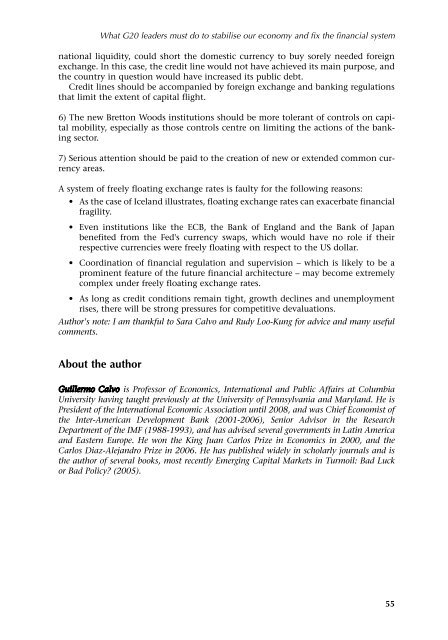What G20 Leaders Must Do To Stabilise our Economy and Fix ... - Vox
What G20 Leaders Must Do To Stabilise our Economy and Fix ... - Vox
What G20 Leaders Must Do To Stabilise our Economy and Fix ... - Vox
You also want an ePaper? Increase the reach of your titles
YUMPU automatically turns print PDFs into web optimized ePapers that Google loves.
<strong>What</strong> <strong>G20</strong> leaders must do to stabilise <strong>our</strong> economy <strong>and</strong> fix the financial systemnational liquidity, could short the domestic currency to buy sorely needed foreignexchange. In this case, the credit line would not have achieved its main purpose, <strong>and</strong>the country in question would have increased its public debt.Credit lines should be accompanied by foreign exchange <strong>and</strong> banking regulationsthat limit the extent of capital flight.6) The new Bretton Woods institutions should be more tolerant of controls on capitalmobility, especially as those controls centre on limiting the actions of the bankingsector.7) Serious attention should be paid to the creation of new or extended common currencyareas.A system of freely floating exchange rates is faulty for the following reasons:• As the case of Icel<strong>and</strong> illustrates, floating exchange rates can exacerbate financialfragility.• Even institutions like the ECB, the Bank of Engl<strong>and</strong> <strong>and</strong> the Bank of Japanbenefited from the Fed's currency swaps, which would have no role if theirrespective currencies were freely floating with respect to the US dollar.• Coordination of financial regulation <strong>and</strong> supervision – which is likely to be aprominent feature of the future financial architecture – may become extremelycomplex under freely floating exchange rates.• As long as credit conditions remain tight, growth declines <strong>and</strong> unemploymentrises, there will be strong pressures for competitive devaluations.Author's note: I am thankful to Sara Calvo <strong>and</strong> Rudy Loo-Kung for advice <strong>and</strong> many usefulcomments.About the authorGuillermo Calvo is Professor of Economics, International <strong>and</strong> Public Affairs at ColumbiaUniversity having taught previously at the University of Pennsylvania <strong>and</strong> Maryl<strong>and</strong>. He isPresident of the International Economic Association until 2008, <strong>and</strong> was Chief Economist ofthe Inter-American Development Bank (2001-2006), Senior Advisor in the ResearchDepartment of the IMF (1988-1993), <strong>and</strong> has advised several governments in Latin America<strong>and</strong> Eastern Europe. He won the King Juan Carlos Prize in Economics in 2000, <strong>and</strong> theCarlos Diaz-Alej<strong>and</strong>ro Prize in 2006. He has published widely in scholarly j<strong>our</strong>nals <strong>and</strong> isthe author of several books, most recently Emerging Capital Markets in Turmoil: Bad Luckor Bad Policy? (2005).55














